Athlete advocacy plays a crucial role in enhancing mental health awareness and support. It fosters open discussions about mental health challenges, reduces stigma through personal experiences, and emphasizes the importance of mental well-being for all. Advocacy efforts also influence public policy, drive systemic change, and promote community resilience. By leveraging their platforms, athletes inspire fans to prioritize mental health and seek help when needed.
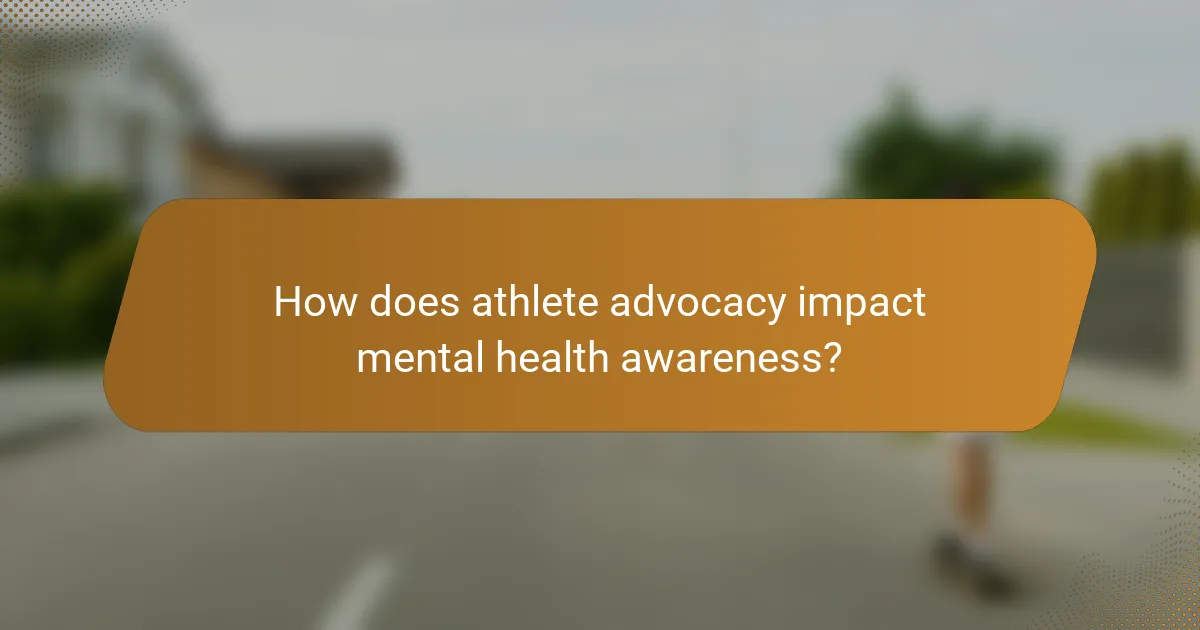
How does athlete advocacy impact mental health awareness?
Athlete advocacy significantly enhances mental health awareness by leveraging the influence of sports figures. Their visibility brings critical issues to the forefront, fostering open discussions about mental health challenges.
Athletes often share personal experiences, which humanizes mental health struggles and reduces stigma. This visibility encourages fans to seek help and promotes a culture of support.
Research indicates that 75% of athletes report feeling pressure to maintain a strong public image, impacting their mental well-being. Advocacy efforts help address these pressures, emphasizing the importance of mental health for everyone, not just athletes.
Moreover, athlete-led initiatives often partner with mental health organizations, amplifying resources and support networks available to the public. This collaboration can lead to increased funding and attention for mental health programs.
What role do athletes play in reducing stigma around mental health?
Athletes play a crucial role in reducing stigma around mental health by using their platforms to raise awareness. Their visibility helps normalize conversations about mental health, encouraging openness and support among fans and peers.
Research shows that when high-profile athletes share their mental health struggles, it fosters a culture of acceptance. For instance, athletes like Kevin Love and Naomi Osaka have openly discussed their experiences, inspiring others to seek help.
This advocacy not only benefits individuals but also promotes a broader societal shift towards prioritizing mental well-being. As a result, communities become more supportive environments for those facing mental health challenges.
Additionally, athlete-led initiatives often lead to increased funding for mental health programs, further enhancing resources available for those in need.
Which mental health issues are most commonly addressed by athlete advocacy?
Athlete advocacy commonly addresses anxiety, depression, eating disorders, and stress management. These issues significantly impact athletes’ performance and overall well-being. Advocacy efforts aim to raise awareness, reduce stigma, and promote mental health resources. For example, initiatives often focus on providing support networks and mental health education tailored for athletes.
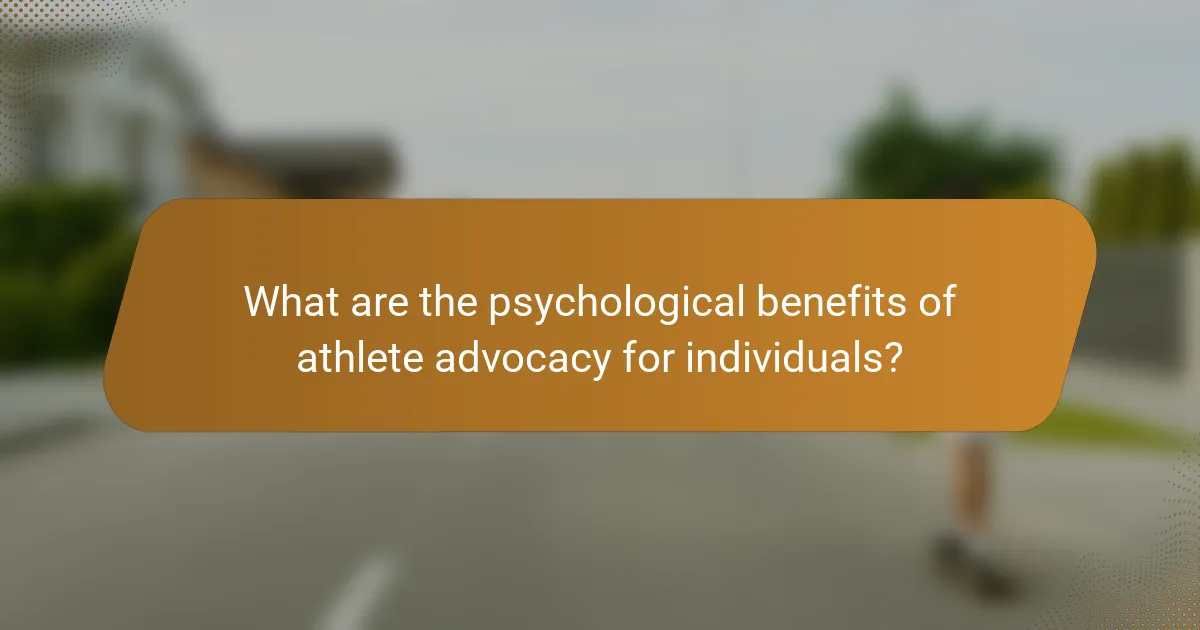
What are the psychological benefits of athlete advocacy for individuals?
Athlete advocacy significantly enhances mental health by promoting self-esteem, community support, and resilience. Engaging in advocacy allows athletes to share their experiences, fostering a sense of belonging. This shared understanding can reduce feelings of isolation and anxiety. Additionally, athletes often become role models, inspiring others to prioritize their mental health. Research indicates that advocacy can lead to improved coping strategies, ultimately benefiting both advocates and their communities.
How does athlete advocacy promote resilience among athletes?
Athlete advocacy enhances resilience among athletes by fostering a supportive environment. This support helps athletes cope with mental health challenges and encourages open dialogue about their experiences. Advocacy initiatives often provide resources and education, empowering athletes to develop coping strategies. As a result, athletes become more equipped to handle stressors, ultimately improving their overall performance and well-being.
What are the emotional benefits of sharing personal mental health experiences?
Sharing personal mental health experiences fosters emotional benefits like connection, validation, and empowerment. Athletes advocating for mental health can create a supportive community, reducing feelings of isolation. This advocacy encourages open conversations, helping individuals feel understood and less alone in their struggles. Additionally, sharing experiences can enhance resilience by demonstrating that challenges are surmountable, inspiring others to seek help and engage in their mental health journey.
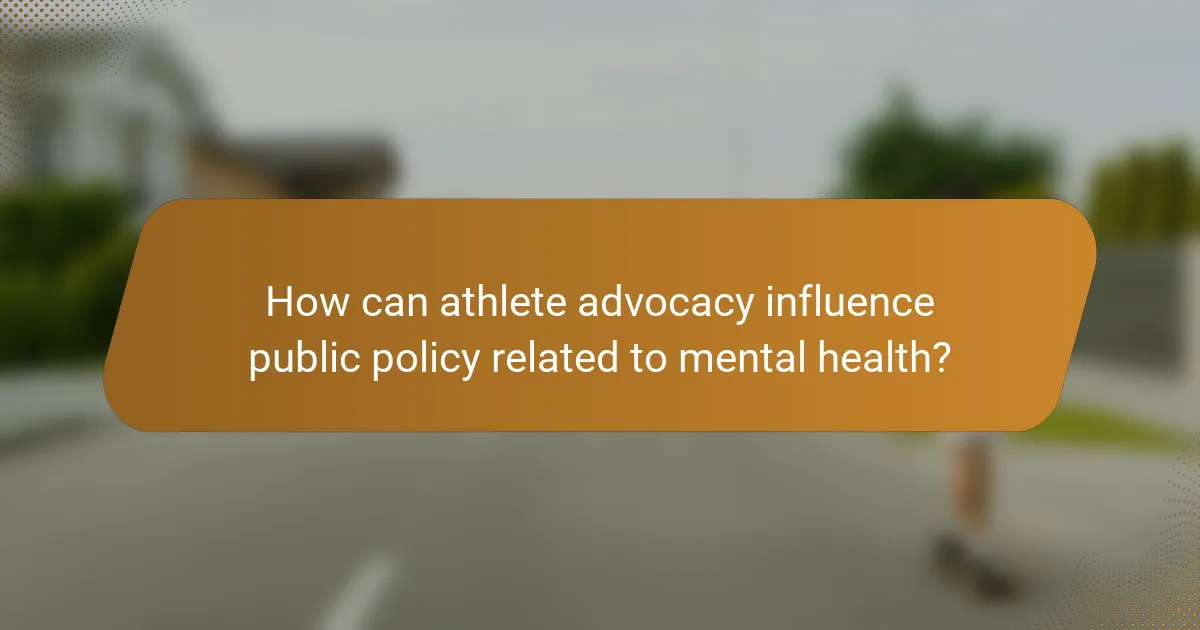
How can athlete advocacy influence public policy related to mental health?
Athlete advocacy significantly influences public policy related to mental health by raising awareness and driving systemic change. Athletes leverage their platforms to highlight mental health issues, thereby encouraging policymakers to prioritize mental health initiatives. This advocacy can lead to increased funding for mental health programs and legislation that supports mental wellness in sports and beyond. For instance, high-profile athletes sharing personal struggles can destigmatize mental health challenges, prompting broader societal acceptance and action. As a result, athlete advocacy not only shapes public discourse but also fosters a supportive environment for mental health policies.
Which successful campaigns have shaped mental health policies?
Successful campaigns that have shaped mental health policies include athlete advocacy initiatives. These campaigns raise awareness, reduce stigma, and promote mental health resources. For instance, the “Mental Health Awareness Month” led by various sports organizations has significantly influenced public perception and policy changes. Additionally, high-profile athletes like Michael Phelps and Naomi Osaka have openly discussed their mental health struggles, encouraging systemic changes in mental health support within sports. As a result, these advocacy efforts have led to enhanced mental health policies at both organizational and governmental levels.
What legislative changes have been influenced by athlete advocacy?
Athlete advocacy has led to significant legislative changes focused on mental health support. For instance, various sports organizations have implemented policies mandating mental health resources for athletes. This shift reflects a growing recognition of mental well-being as a critical component of athletic performance. Additionally, advocacy efforts have influenced laws promoting mental health education and resources at all levels of sport. These changes aim to reduce stigma and enhance support systems for athletes facing mental health challenges.
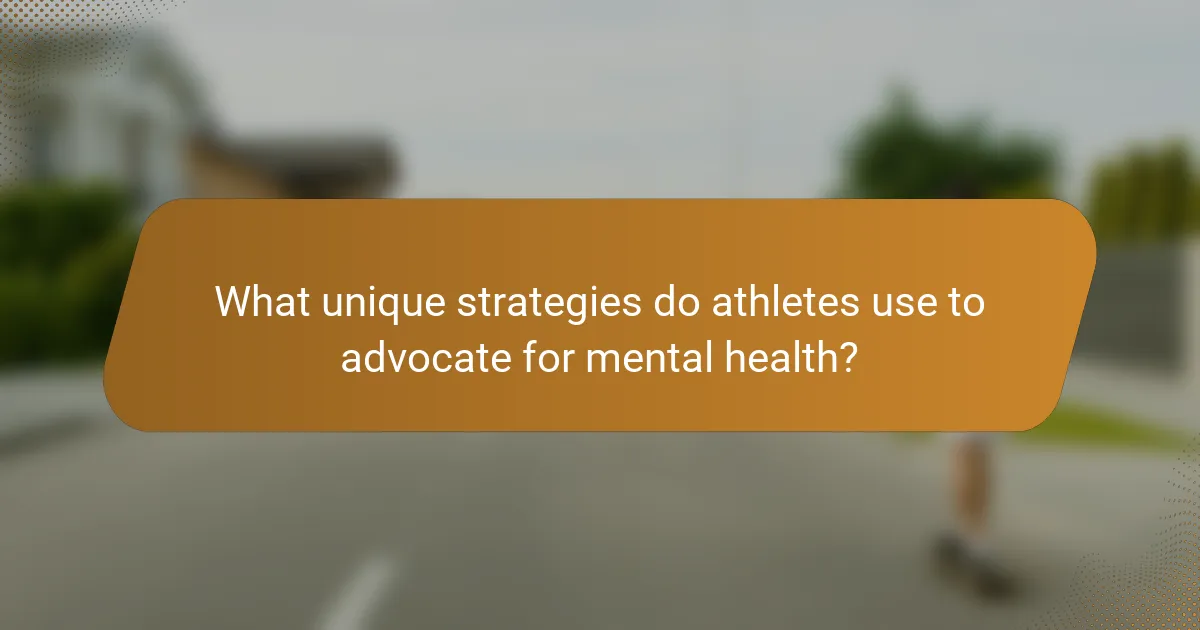
What unique strategies do athletes use to advocate for mental health?
Athletes use various unique strategies to advocate for mental health, significantly benefiting public awareness and acceptance. They leverage their platforms to share personal experiences, fostering a sense of community and support. Social media engagement allows athletes to connect directly with fans, promoting mental health resources and initiatives. Collaborations with mental health organizations enhance outreach, providing credible information and support networks. Hosting events and discussions raises visibility, encouraging open dialogue about mental health challenges. These strategies not only empower athletes but also inspire others to prioritize their mental well-being.
How do social media platforms amplify athlete advocacy messages?
Social media platforms amplify athlete advocacy messages by providing wide-reaching visibility and fostering community engagement. These platforms enable athletes to share personal stories, raise awareness about mental health issues, and connect with followers on a deeper level. As a result, advocacy messages gain traction and influence public perception.
The interactive nature of social media encourages dialogue, allowing athletes to engage directly with fans and stakeholders. This connection can lead to increased support for mental health initiatives and resources. Moreover, the shareability of content on these platforms helps spread messages rapidly, reaching diverse audiences and inspiring action.
Athlete advocacy on social media can also challenge stigma surrounding mental health. By openly discussing their struggles, athletes normalize these conversations, making it easier for others to seek help. This unique attribute of athlete-led advocacy contributes significantly to shifting societal attitudes towards mental well-being.
In summary, social media serves as a powerful tool for athletes to amplify their advocacy messages, creating a supportive environment for mental health awareness and change.
What role do partnerships with mental health organizations play?
Partnerships with mental health organizations enhance athlete advocacy by providing resources and expertise. These collaborations help raise awareness, reduce stigma, and promote mental health initiatives. For example, athletes can leverage organizational platforms to reach broader audiences, fostering community support. As a result, athletes become effective advocates, driving positive change in mental health perceptions and access to care.
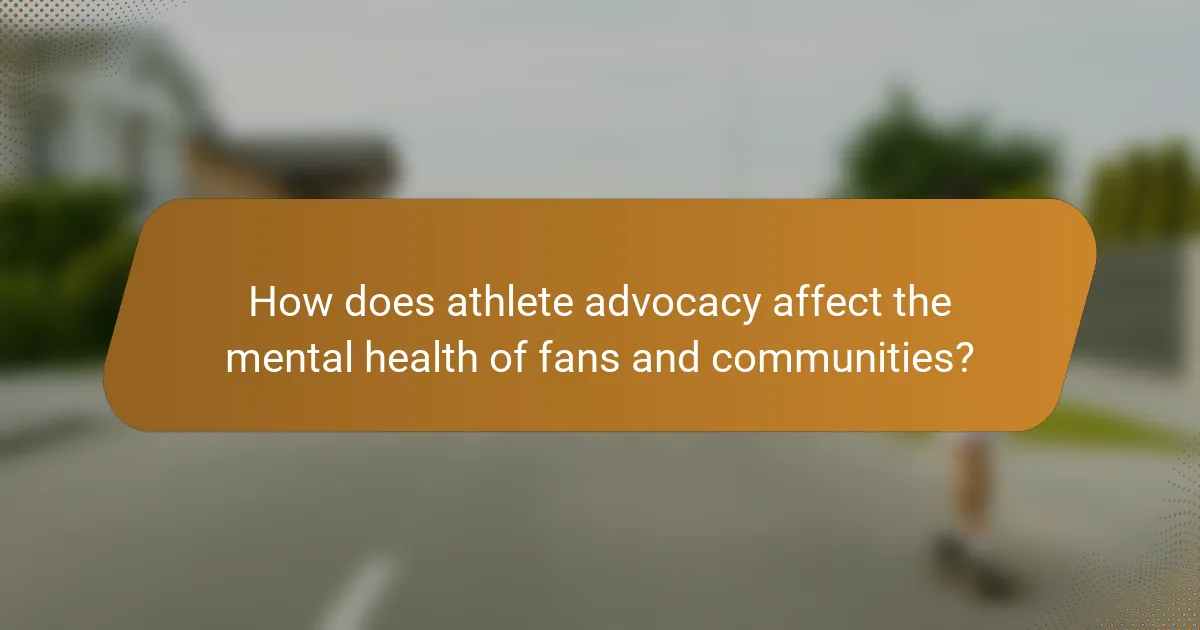
How does athlete advocacy affect the mental health of fans and communities?
Athlete advocacy significantly enhances the mental health of fans and communities by promoting awareness and support. This engagement fosters a sense of belonging and connection among fans, reducing feelings of isolation. For example, initiatives led by athletes can encourage open discussions about mental health, leading to increased understanding and empathy.
Additionally, athletes often serve as role models, inspiring fans to seek help and prioritize their well-being. Programs that involve athletes in mental health campaigns have shown to improve community morale and resilience. In summary, athlete advocacy not only supports individual mental health but also strengthens community bonds through shared experiences and collective action.
In what ways do athletes inspire fans to seek help for mental health issues?
Athletes inspire fans to seek help for mental health issues by openly sharing their struggles and promoting awareness. Their visibility encourages conversations around mental health, reduces stigma, and highlights available resources. For instance, high-profile athletes discussing their experiences can motivate fans to prioritize their well-being. This advocacy fosters a supportive community where individuals feel empowered to seek assistance. As a result, athletes serve as relatable role models, demonstrating that mental health is as crucial as physical health.
What community initiatives have been launched as a result of athlete advocacy?
Athlete advocacy has led to numerous community initiatives that enhance mental health support. Programs include peer support networks, mental health workshops, and awareness campaigns. These initiatives aim to destigmatize mental health issues and promote well-being among athletes and the broader community. As a result, athletes are using their platforms to foster environments that prioritize mental health care and accessibility.
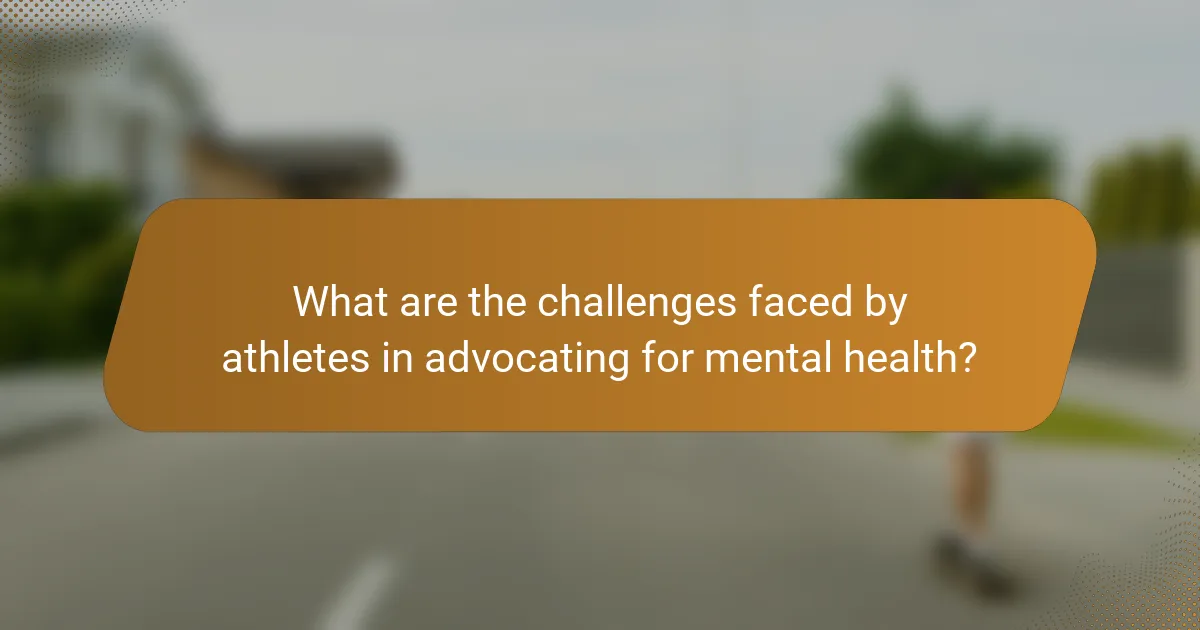
What are the challenges faced by athletes in advocating for mental health?
Athletes face significant challenges in advocating for mental health, including stigma, lack of resources, and limited support. Stigma often leads to fear of judgment, discouraging open discussions. Many athletes lack access to mental health resources tailored to their needs. Additionally, support systems within sports organizations may be insufficient, hindering effective advocacy. These obstacles can prevent athletes from fully addressing their mental health and promoting awareness in their communities.
How do athletes balance personal struggles with public advocacy?
Athletes balance personal struggles with public advocacy by using their platforms to raise awareness and foster community support. This advocacy provides mental health benefits, such as reducing stigma and promoting open discussions. Engaging in advocacy can empower athletes, helping them process their own challenges while inspiring others. Research shows that public figures discussing mental health can significantly influence societal perceptions, fostering a culture of acceptance.
What are the risks associated with athletes sharing their mental health journeys?
Athletes sharing their mental health journeys can face risks such as stigma, vulnerability, and potential backlash. These challenges may deter athletes from advocating openly, despite the positive impact of their stories. Stigma can lead to negative perceptions from fans and peers. Vulnerability may expose athletes to criticism or judgment. In some cases, backlash from sponsors or organizations can occur if their narratives clash with brand images. Balancing personal expression and professional expectations is crucial for athletes in advocacy roles.

What best practices should athletes follow when advocating for mental health?
Athletes should prioritize open communication, education, and community support when advocating for mental health. These practices foster awareness and reduce stigma.
1. Share personal experiences to humanize mental health struggles.
2. Collaborate with mental health professionals for accurate information.
3. Engage with fans and peers to create supportive environments.
4. Utilize social media to amplify messages and reach wider audiences.
As a result, advocacy can lead to improved mental health resources and a culture of acceptance in sports.
How can athletes ensure their advocacy efforts are effective and responsible?
Athletes can ensure their advocacy efforts are effective and responsible by prioritizing mental health awareness, engaging with mental health professionals, and using their platform to promote evidence-based practices. They should focus on transparency, share personal experiences, and encourage open dialogue. Collaborating with mental health organizations enhances credibility and reach. Regularly assessing the impact of their advocacy through feedback and metrics ensures ongoing improvement and relevance.
What common mistakes should athletes avoid in their advocacy efforts?
Athletes should avoid being overly self-promotional, neglecting their audience’s needs, and failing to engage with mental health professionals. These mistakes can undermine the positive impact of their advocacy.
Focusing solely on personal experiences without broader context can alienate supporters. Additionally, ignoring the importance of collaboration with mental health organizations limits the effectiveness of their message. Lastly, not addressing diverse mental health issues can lead to a narrow advocacy approach.
